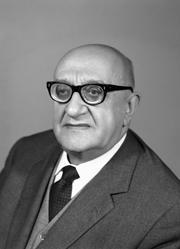Luigi Polano
Luigi Polano (born April 3, 1897 in Sassari ; † May 24, 1984 ibid) was an Italian communist politician.
Life
Luigi Polano did a commercial apprenticeship after high school. He was politicized at the age of fifteen when universal male suffrage was first introduced in Italy in 1912. In 1914 he was a functionary of the regional "Federazione Giovanile Socialista Italiana" and from 1917 in Rome of the national youth organization of the Partito Socialista Italiano (PSI). For taking part in a pacifist demonstration there, he was fined Lire 83 and went to prison for the first time. In 1918 he was repeatedly imprisoned for defeatism and pacifism . In January 1919 he was nominated Roman delegate to the general assembly of the Confederazione Generale Italiana del Lavoro (CGIL).
In 1919 he took part in the founding congress of the Communist Youth International (KJI) in Berlin and was a member of the KJI's executive committee until 1921. As such, he was also a delegate at the 2nd Congress of the Communist International ; Nicola Bombacci was among the Italians . In January 1921 he was one of the founders of the Communist Party of Italy (PCI) and he became secretary of their youth organization "Federazione Giovanile Comunista Italiana". In 1923 he was arrested again in Trieste , where he was supposed to set up a newspaper, and after the establishment of fascism in Italy, he fled abroad, where he had to stay for twenty years. From 1925 to 1930 he was a party instructor at the Interclub of Seamen and Dock Workers in Odessa , after which he was an employee of the International Union of Seamen and Harbor Workers (ISH) in Novorossiysk and Batumi until 1938 . Further agitation activities that were to lead him to the Italian emigrants in the USA and Argentina are not known with certainty. During the Spanish Civil War he was more likely to be in Moscow than with the International Brigades . Polano survived the various Stalinist purges and murders as director of an invalid house for Spanish fighters in Moscow . During the Second World War he was commissioned by Palmiro Togliatti to use a jammer to interfere with the Italian state radio station EIAR , whose fascist director Mario Appelius was released in 1946 under the amnesty of Justice Minister Togliatti. Polano received the Soviet Order of the Red Banner of Labor , the medal “For the Defense of the Caucasus” and the medal “For heroic work in the Great Patriotic War 1941–1945” .
After the fall of the Mussolini regime and the end of World War II, Polano returned to Sassari. He was a member of the PCI in the Italian Parliament in 1948 and was re-elected twice, after which he served in the Senate from 1964 to 1968 . In 1972 he received the Gold Star of Friendship in the GDR .
Fonts
- Sugli scambi commerciali Italia Repubblica Democratica Tedesca . Roma: Bardi, 1965
- How far is an autonomy of the communist youth organization in the communist movement necessary and possible today? St. Petersburg: Verlag der Jugend-Internationale, 1921
literature
- Guido Melis: Luigi Polano , in: Franco Andreucci, Tommaso Detti (eds.): Il movimento operaio italiano. Dizionario biografico . Roma, Editori Riuniti, 1975
- Vindice Lecis: La voce della verità. Storia di Luigi Polano, il comunista che beffò Mussolini . Collana: Igloo 2014
Web links
- Literature by and about Luigi Polano in the bibliographic database WorldCat
- Luigi Polano , at Camera dei deputati
- Luigi Polano , at Senato della Repubblica
- Luigi Polano , at Exiled Books
Individual evidence
- ↑ a b c d e Guido Melis: Vita di Luigi Polano, il comunista che fece impazzire l'Eiar , at Rassegna Sindacale CGIL
- ^ A b c Martin Schaad: The fabulous confessions of comrade Alfred Kurella: a biographical search for traces . Hamburg: Hamburger Ed. 2014, short biography p. 169f
- ^ Luigi Polano , in: Neues Deutschland , June 30, 1972
| personal data | |
|---|---|
| SURNAME | Polano, Luigi |
| BRIEF DESCRIPTION | Italian communist politician |
| DATE OF BIRTH | April 3, 1897 |
| PLACE OF BIRTH | Sassari |
| DATE OF DEATH | May 24, 1984 |
| Place of death | Sassari |
